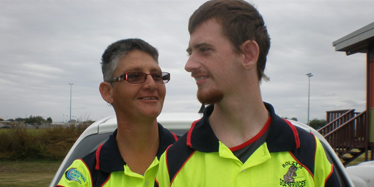Bolzy's Go4 Services

Seeing her son, Ryan, 'bored out of his brain' at home in Mackay motivated Michelle Boles to think about how she could help him gain and keep a job.
Ryan Boles is nonverbal, and has multiple and complex disabilities—including autism, intellectual disability, cerebral palsy and visual impairment. He had been deemed as not having the capacity to work by Centrelink.
Michelle has been an active advocate for people with a disability or mental illness in the community. She founded the Disability Enhancement Fund and is a former Chairperson of the Mackay-Whitsunday Regional Disability Council and President and Secretary of the Mackay District Special School.
She realised that her son could do ‘odd jobs', and wanted him to ‘lead as normal a life as possible'. ‘I didn't want Ryan to be spending his time walking along the beach, going tenpin bowling and doing other menial tasks,' she says. ‘I thought, "What is something that Ryan can do to give him a sense of purpose?"'
With assistance from friends, family and the community, she has started a business for Ryan, Bolzy's Go4 Services.
Ryan is washing tea towels and taking lunch orders for local businesses for a fee. He offers services including picking up mail, doing grocery shopping, watering plants, taking out wheelie bins, returning library books and DVDs and delivering flyers. Staff support Ryan with his work, and he has a company car—even though he does not drive.
‘The people that he is supporting think it is wonderful,' Michelle says. ‘The more I can get him involved with the community, the more the community can look after him.'
The Construction, Forestry, Mining and Energy Union (CFMEU), Carers Queensland, the Regional Social Development Centre (RSDC), Life Stream Foundation and ANZ Bank at Canelands are some supporters of the business. The RSDC helped Michelle create a business plan, the CFMEU paid for Ryan's public liability insurance for 2 years and Carers Queensland provided funding for logos and sign writing on a car. Ryan and his support workers also wear a uniform.
Michelle says that she has noticed a difference in Ryan's behaviour since he started working. ‘His behaviour is much better,' she says. ‘He is much happier.'
She believes he is developing valuable life skills by being involved in work. ‘He is meeting people, so he has to learn eye contact and fine motor skills,' she says. ‘He also has to learn concentration. By doing it every day or every few days, it will teach him something. He will be able to do lots and lots of things that he was never taught at school.'
Michelle also has plans for the future of Bolzy's Go4 Services. ‘I'd love Ryan to be able to employ another person with a disability and their support worker,' she says.
Michelle's business tips
Michelle says that parents, carers and support workers who are interested in helping a person with a disability or mental illness set up a business need to firstly work out if this is really what is best for the person.
She has these tips for starting a business:
- Know the gifts and skills of the person, and think about how these may be able to be used in a job.
- Develop an idea and discuss it with friends and family-taking the time to get their support.
- Set up a clear business plan with short- and long-term goals.
- Ask people in the community what they think about the idea, and how they can help to provide support for the person.
- Be confident enough to ask questions if you don't have the answers.
Michelle is a mother of four and also cares for her husband, who has a heart condition and a mental illness. She says that having the right attitude and believing in the person can make all of the difference in making a business goal a reality.
‘We—as parents, carers or support workers-are the person with a disability's main source of support,' she says.
‘We need to dream high for the people that we love to help them reach their potential. People need to be confident in what they are trying to do. There is no such thing as red tape—there is pink elastic, and it stretches.'


